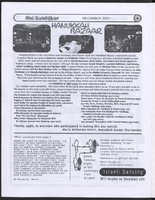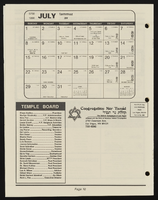Search the Special Collections and Archives Portal
Search Results
Anti-Defamation League Nevada Region Office Records
Identifier
Abstract
The Anti-Defamation League Nevada Region Office Records (2003-2019) mainly contain photographs depicting Anti-Defamation League (ADL) Nevada Region Office events. The collection also includes a sign advertising ADL's "No Place For Hate" program; ARL's 2017 and 2018 gala, "Imagine a World Without Hate" programs and invitations; and 2018's Jurisprudence Luncheon invitation commemorating the achievements and contributions of Joe W. Brown.
Archival Collection
H. E. and Ruth Hazard Political Papers
Identifier
Abstract
The H. E. and Ruth Hazard Political Papers (1937-1977) consist of papers and memorabilia related to Nevada and national Democratic politics. It includes materials about the Nevada legislature; clippings and information about the Nevada Tax Commission; political memorabilia including invitations and programs related to the presidential inaugurations of Lyndon Johnson and Jimmy Carter; documents about the purchase of Basic Magnesium Inc. by the state of Nevada; and newspaper clippings.
Archival Collection
Ralph Roske Photographs
Identifier
Abstract
The Ralph Roske Photographs (approximately 1917-1989) depict life in rural Southern Nevada and newspaper clippings from the Goodsprings Gazette. The collection consists of thirty-five images dated from 1917 to 1989. The images consist of unidentified Nevadans, Las Vegas landmarks, and members of the McAllister family in Carraca, Nevada.
Archival Collection
Holocaust Survivors Group of Southern Nevada Records
Identifier
Abstract
The Holocaust Survivors Group of Southern Nevada records (1965, 1972, 1999-2016) mainly consist of organizational records created by the board of directors and officers of the group, stories about the experiences of local Holocaust survivors, and ephemera related to the Holocaust Survivors Group and the local Jewish community. Organization records include meeting minutes, correspondence, by-laws, and a list of officers. Materials also include a video recording of a 2006 Yom Hashoah memorial service to remember the Holocaust at Temple Beth Sholom and the Spring 2016 issue of
Archival Collection

Alpha Kappa Alpha Sorority, Theta Theta Omega Chapter scrapbook
Date
Archival Collection
Description
From the Alpha Kappa Alpha Sorority, Incorporated, Theta Theta Omega Chapter Records (MS-01014).
Mixed Content

Mabel Hoggard: religious materials
Date
Archival Collection
Description
Folder of materials from the Mabel Hoggard Papers (MS-00565) -- Personal papers file. This file contains religious booklets, programs, newspaper clippings, and other documents. Represented in the materials are records from: Griffith United Methodist Church, Church Women United of Greater Las Vegas, Zion Methodist Church, Clark County Protestant Ministerial Association, and Desert Southwest Conference of the United Methodist Church.
Mixed Content

Transcript of interview with Maxwell Kent "Tim" Hafen by Stefani Evans and Claytee White, September 14, 2016
Date
Archival Collection
Description
With so much emphasis put on the growth of Las Vegas and Henderson over the past thirty years, we often forget about the development of the others cities in the Valley. Expansive growth in Southern Nevada in the mid-twentieth century shows the region being one of the last bastions of agricultural existence, and Tim Hafen has been a major player in the development of the city of Pahrump. Born in St. George, Utah, and raised in Mesquite, Nevada, he graduated from Virgin Valley High School and attended Dixie College. Before the Bureau of Land Management (BLM) was called as such, his father introduced him to the working of the land through dairy and hay farming, where a young Tim decided he would never milk a cow again. His rejection of cow milking didn’t deter him from following the influence of his father after he married his wife, Eleanor, in 1951 and moved to Pahrump to become a cotton farmer. At that time, there were only 150 people in the area with a third of the population being from the Paiute tribe. Once the city was incorporated in 1964, he founded the Pahrump Valley Utility Company to get electricity to the area along with Amargosa Valley. Top crops at the time included cotton, alfalfa as well as wheat that were picked by Mexican farm laborers used under a yearlong contract with the Bracero program. vi In this interview, Hafen shares how he began his career in politics from getting called for grand jury in 1963. From 1966–1974, he was a member of the legislature, where he served two terms in the Old Capital building and held various positions such as Chairman of the State Board of Agriculture for twelve years and President of the Nevada Farm Bureau. He was speaker pro tem and Chairman of the taxation committee and decided to call it quits because of the Nixon scandal. Between 1974 and 1975 Hafen ended his political career, which he did before brothels began to come to the area later in the decade. In 1982, in the wake of the gasoline crisis, Hafen, like other Pahrump cotton farmers, could not afford to continue farming; he decided to shift from farming to development. His first development done was Cottonwoods at Hafen Ranch, which was on 160 acres of alluvial fan, non-farmable land; in 2000 he opened his second subdivision, Artesia at Hafen Ranch.
Text

Transcript of interview with Audrey Wickman by Joanne Goodwin, June 24, 1996
Date
Archival Collection
Description
Born in the coal fields of Strunk, Kentucky, Audrey Aline Messer Wickman first visited the West at twelve years of age. She moved to western Colorado to help in her grandparents’ home for a couple of years. The stay made a lasting impression because she only returned to her birthplace for a short time after that. In Colorado, she graduated from high school, met her future husband, and married in 1925. They came to southern Nevada in 1932 so that Robert Wickman could find work on Hoover Dam. Audrey Wickman joined the Mesquite Club in 1936 and has remained a member to date. She started the Literary Committee as a forum to share book reviews and hear speakers. She served as President of the club for 1947-48 and chose the year’s theme “Know your Neighbor.” In the post-war society, women’s involvement in civic affairs was particularly needed, she told the membership at the opening fall meeting. “The troubles which unsettle the world today are primarily ones which lie within the sphere of women’s business. They are matters of housekeeping, teaching and health. . . . The time has come when we as a nation cannot stay in our own backyards. . . . If we are to be good world citizens, local, state and national, we must first be good home citizens. These responsibilities call for knowledge, an appreciation of other points of view, and attitudes of good will and cooperation.” (Las Vegas Review Journal, 6 October 1947, Mesquite Club microfilm collection.) The duties of the president varied during those years. She recalled that “I was janitor, gardener and President.” During the wintertime, she remembered, “you had to have heat [for Friday’s meeting] and I’d go up on Thursday afternoon and light that old oil burning stove and then pray that it didn’t catch the place on fire all night.” She continued her commitment to club work by serving as state secretary for the Nevada Federation of Women’s Clubs. The friendships and cultural events which came from Mesquite Club and Federation membership proved to be of lasting value for this community builder. This interview has been produced with the assistance of the Mesquite Club and the History Department of the University of Nevada, Las Vegas. It is part of a series on women community builders in Las Vegas. The transcript has been edited only slightly for clarity while the syntax and style of the narrator were retained.
Text


